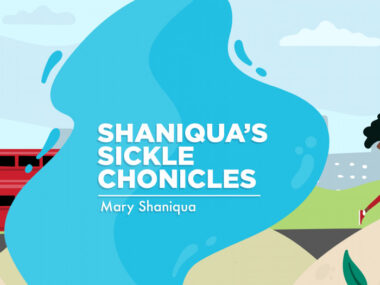Advancing representation of Black and sickle cell communities in media
How Netflix's new series 'Supacell' amplifies our voices, raises awareness
Written by |

Growing up in South London is a rare experience. There’s a plethora of rich and diverse African and Caribbean communities that have influenced the area’s culture. Word of mouth goes a long way, and sharing stories builds relationships and community.
These stories often feature our lived experiences, including the injustices, challenges, and triumphs we face. Growing up as a Black man with sickle cell disease meant there were many social issues to take on, such as racism, lack of representation, and medical negligence. My life today would look much different had I not had the support of my local community in navigating these issues.
Still, I experienced many difficult moments as a child. During these times, I’d turn to fiction.
The fictional stories that have always resonated with me are those in which the main character overcomes all odds, usually because of a superpower — granted by a spider bite or, often, a genetic mutation. Growing up, I wished that sickle cell would give me superpowers instead of pain.
These stories offered me an escape from my reality of pain crises and the injustices and hardships I felt as part of the Black community. My support network taught me to be resilient and gave me the self-belief to keep moving forward. Still, sickle cell was rarely spoken about in the global Black community and mainstream media, which always left me feeling isolated.
As a result, I could never fully identify with the characters from my books. They weren’t from the same place as me, they didn’t look like me, and there was never any mention of sickle cell. And within my local Black community, health concerns were a taboo topic; the stigma associated with sickle cell made it feel like something to hide instead of share.
For a long time, the disease felt unique to me.
Finally seeing myself on screen
But what gives me hope for future generations is that awareness about sickle cell, the need for blood donations, and the concern for medical racism are growing more than ever. Netflix’s new series “Supacell” is one such example of progress. The show sheds light on sickle cell disease, as well as the issues faced by the Black community.
In “Supacell,” five Black South Londoners discover they have superpowers and band together to save a loved one. The source of their power is linked to having one parent with sickle cell.
Seeing a story like this one on a global platform is heartwarming because a younger version of me could never have imagined it. Representation matters, and I’m sure the show will help spread awareness about the issues affecting the Black and sickle cell communities. Furthermore, it’ll resonate with people whose voices have long gone unheard.
I was pleased to see that “Supacell” doesn’t just use sickle cell as a throwaway joke or an honorable mention; it is an integral part of series. As an advocate, I believe “Supacell” is helping to amplify the voices of sickle cell patients. It feels like a fundamental shift in representation to see my community’s stories being told with nuance and shared with a broader audience.
Of course, more must be done to raise awareness about sickle cell and the issues we face, but this show is another step forward. There’s power in sharing stories, and I hope it builds better relationships across all races.
To Rapman, the show’s creator, and everyone else who worked on “Supacell,” thank you for empowering those of us affected by sickle cell. This South Londoner‘s heart is filled with pride and joy.
Note: Sickle Cell Disease News is strictly a news and information website about the disease. It does not provide medical advice, diagnosis, or treatment. This content is not intended to be a substitute for professional medical advice, diagnosis, or treatment. Always seek the advice of your physician or other qualified health provider with any questions you may have regarding a medical condition. Never disregard professional medical advice or delay in seeking it because of something you have read on this website. The opinions expressed in this column are not those of Sickle Cell Disease News or its parent company, Bionews, and are intended to spark discussion about issues pertaining to sickle cell disease.



Leave a comment
Fill in the required fields to post. Your email address will not be published.